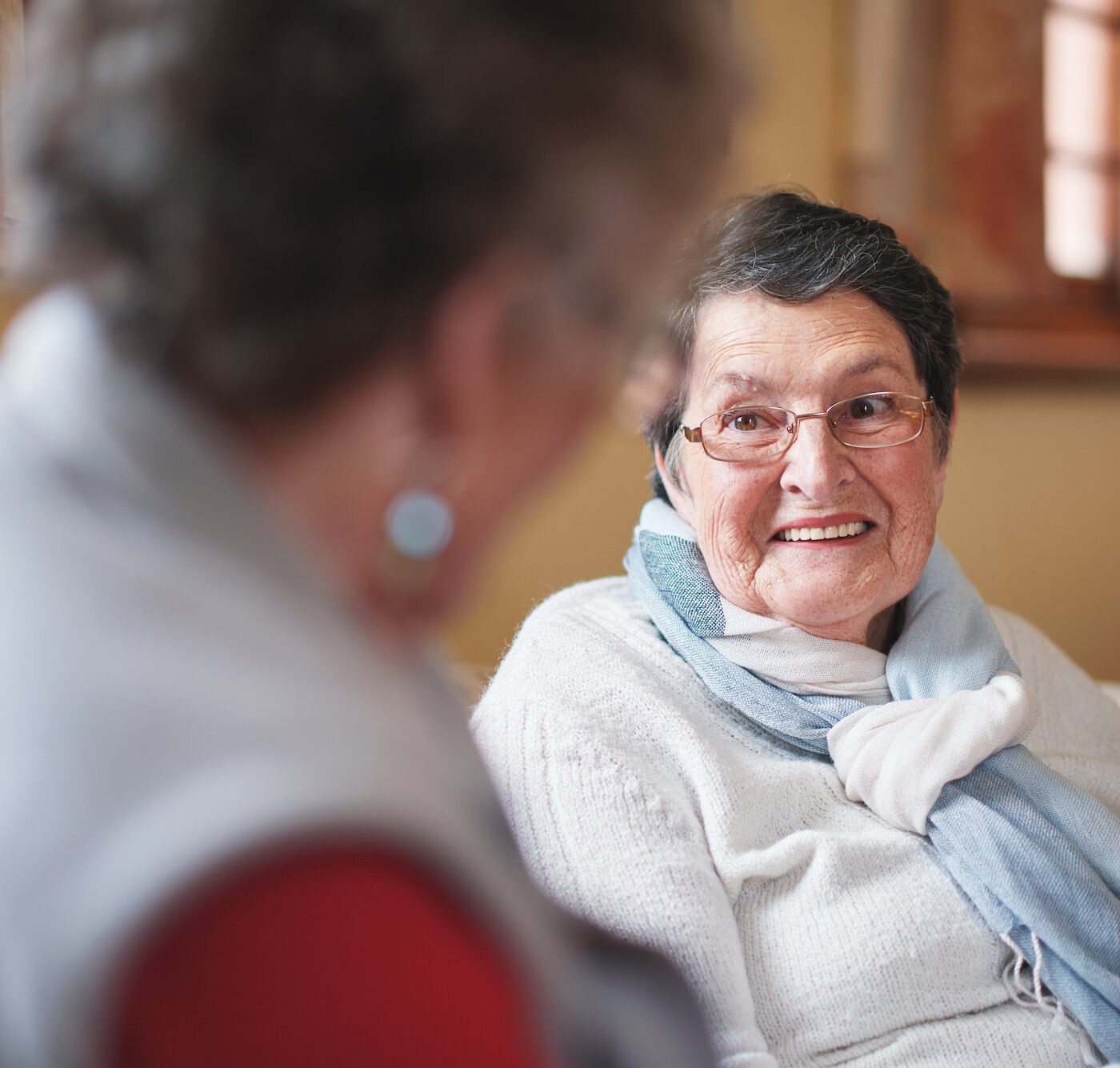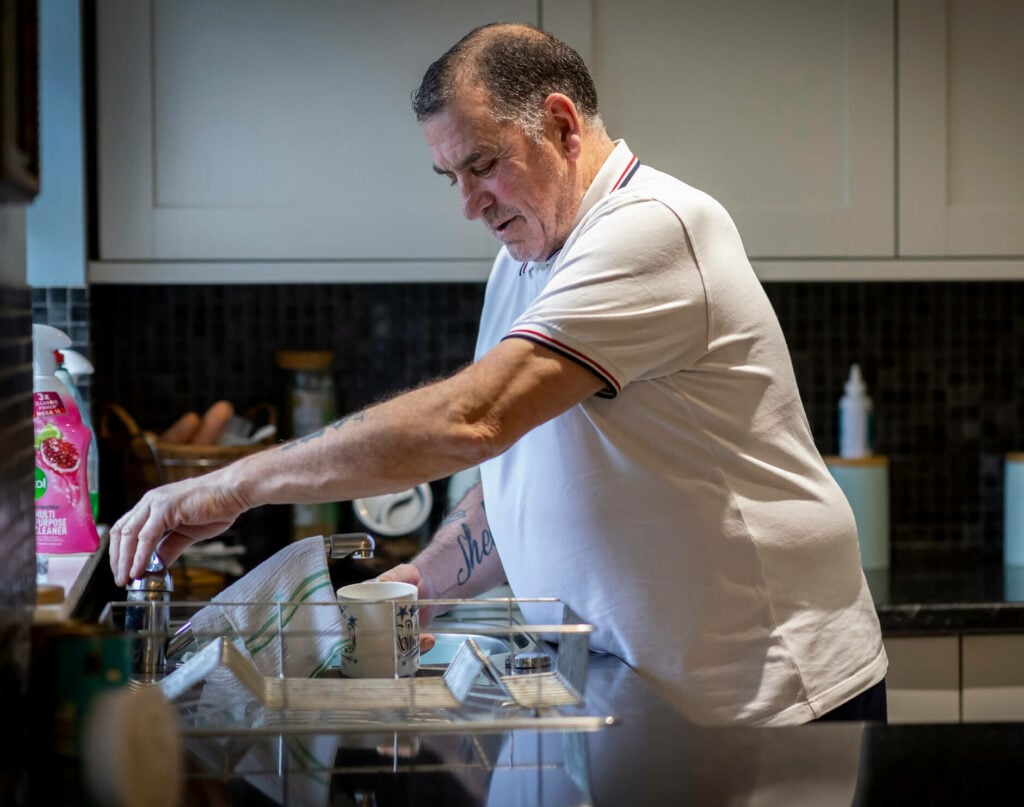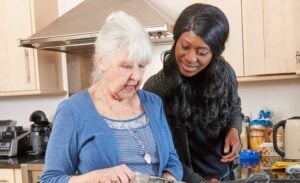How to deal with challenging behaviours in the elderly
Tags
Elderly Care
This article is for informational purposes only and not to be taken as medical advice. For medical advice, always consult your GP.
While caring can be a rewarding, it’s not without difficulties, particularly when providing care for someone displaying unpredictable and challenging behaviours.
Whilst these challenging changes in behaviour most often aren’t a person’s fault, it’s important they’re managed properly. If not, it can have a negative impact on your loved one’s mental health and wellbeing – as well as that of their carer.
Not only that, but behavioural problems may cause older people to withdraw from their friends and family, leading to increased isolation.
Examples of challenging behaviours in older adults
A person’s behaviour may be considered “challenging” if it can potentially cause harm to themselves or others, including their caregiver, or if it harms their overall quality of life and can also affect their participation in daily life.
According to the NHS, challenging behaviour can consist of the following –
- Self-harm – for example, using aggression or violence towards themselves or abstaining from food or drink.
- Aggressive behaviour
- Disruptiveness – including shouting or refusing care
- Destructiveness – for instance, damaging property belonging to themselves or others
- Other emotional outbursts
Why do older adults display challenging behaviour?
Occasionally, older people will lash out at the person who is making the biggest effort to ensure their well-being. This may be out of frustration, for example, if an older person is unable to do certain things for themselves anymore, or if they feel they are no longer in control of their day to day lives.
An older person may also be worried about the future, for example if they need professional care they may worry about how they’re going to pay for it, or about losing their home and moving into a care home. If they’re dealing with the grief or loss of a spouse or close friend they may experience depressive symptoms – especially if they were taught not to discuss their emotions and feelings, but which have to have an outlet regardless.
Hoarding can be common among older people. While it may not seem dangerous, if clutter starts to build up it can make their home unsafe – leading to trip hazards to items falling. Sometimes an older person can become upset at the thought of parting with the things they’ve collected.
Medical conditions can lead to challenging behaviour too. For example if an older person finds it difficult to get out and about, is not well enough for regular social interaction, or is living with sensory loss they may become lonely. An older person may feel too proud to share how they’re feeling and instead lash out, disengage, or become quite negative.
One of the most common causes of challenging behaviour in later life are conditions such as Alzhiemer’s, or dementia. These conditions impact how a person processes and communicates with the world around them, and may get worse as a person moves through the stages of dementia. This can sometimes be a frightening and lonely experience, and can also make it more difficult for an older person to have their needs met, for example if they’re hungry or in pain, resulting in emotional outbursts.
It’s important to understand what triggers certain behaviours in life and daily activities, as it might be possible to prevent them from happening as frequently. It can take time to recognise patterns, however some common triggers or risk factors can include –
- Tiredness or sleep disorders
- Change of routine
- Noise
- Pain/discomfort
- Significant life events
- Changes in living environment
- Medication
- Memory loss
- Difficulties communicating
- Loss of control and fear of the unknown

Strategies for managing challenging behaviour
As a caregiver, it’s important to consider the possible reasons behind the aggressive or agitated behaviour exhibited by the person you’re caring for, such as anxiety, boredom, pain or mental health issues. It may also help to try some of the following –
- If being in a large group of people causes anxiety and agitation, they may benefit from smaller group settings with familiar people or individual support.
- Give them a different perspective, for example talk to them and ask them to imagine how a loved one or a partner would feel if they were experiencing this behaviour .
- If possible, try to discuss the anger or abuse with your parent and tell them how it makes you feel, as there is a good chance that they haven’t stopped to consider your feelings. They may be shocked to discover that they have upset you.
- Offer a distraction. If you’re having a conversation you could try changing the subject, or talking about a happy time in their past if they enjoy reminiscing. It may help to play their favourite music or take them to a different room or the garden. If distraction does not work, sometimes you will just have to wait it out
- Sometimes older people will behave worse around the people closest to them. To counter this, you may wish to arrange a few hours of respite support – either through a professional service, or even having a friend or neighbour sit with them.
- If a person is experiencing attention seeking behaviour, it may help to expand their social circle by helping them find a social club they’d enjoy, or taking them to day centres or coffee mornings. This ‘ll allow them to focus on something other than your attention.
- If an older person’s behaviour is caused by paranoia or delusions, listen and acknowledge how they’re feeling. Don’t try and convince them that what they’re feeling isn’t real as this may make the situation worse, instead try and reassure them that they’re safe and you’re there for them.
- Give them as much control as you can. For example let them have input into their daily routine, for example when they shower, and how they dress.
- If hoarding has become an issue, try gently discussing giving some items away to charity, and how they could help make someone else happy. It may help to make a special memory box to keep important things tidy.
- Remember that an outburst is rarely personal. If you feel yourself getting angry or upset leave the room as soon as it’s safe to do so and take a deep breath.
How to deal with inappropriate behaviour in older adults
Inappropriate behaviour in adults who require care may occur as a result of mental health or cognitive impairment caused by dementia.
It could include:
- Publicly removing clothing.
- Engaging in non-consensual physical contact with another individual.
It can be really difficult to witness or discuss this type of behaviour with a loved one. The following may help –
- Consider the reasons behind someone’s behaviour or their intentions. For instance, if someone begins to undress in a public setting, it may be helpful to determine if they’re too warm or wearing something they find uncomfortable.
- Approach the situation calmly, shouting or trying to pull them away may be confusing to them.
- Redirect their attention instead of engaging in confrontation.
- If there are others around, explain that the behaviour is because of an illness or disability and isn’t personal.
- Keep a diary to observe patterns in their behaviour, such as specific situations, people present, or times of day or night.
If you would like more information on sexual behaviour and disabilities, you can contact the Outsiders Trust helpline at 07872 681 982.
Professional help
If you’re a family caregiver having trouble managing the difficult behaviour of the person you care for, consult with a GP who may refer you to a specialist health care provider. The specialist will inquire about the specific triggers, early warning signs, and subsequent events associated with the behaviour.
Under certain circumstances, such as when a person’s behaviour poses a threat to themselves or others and traditional calming methods have been exhausted, a doctor may consider prescribing medication.
Other forms of support
- Contact your local carers support group or contact the Carers Direct helpline at 0300 123 1053.
- Get a respite carer for the person you look after so you can take a break.
- Speak with friends and family members so they can give practical and emotional support.
How can live-in care help?
If you’re having a hard time, there’s no need to go through it alone.
Ask for help from a live-in carer, and they’ll move into the home to provide round-the-clock support. From helping to calm challenging behaviour and providing night-time assistance, to cooking meals and keeping the home tidy, they’re happy to help with many everyday tasks. And because they offer one-on-one care, they’re able to give your loved one their undivided attention.
You can work with a live-in carer however best suits you. So, if you still want to be hands-on with caring for your older loved ones, they’ll be there to help when you need it.
There are a variety of ways you can personalise your care, as well, from opting for 24-hour care if a higher level of assistance is required – to choosing companionship care if your loved one just needs a bit of company and help around the house. If the behaviour problems are diagnosed as a symptom of dementia, there are live-in care carers who specialise in complex medical conditions and have experience in dealing with these behaviours.
The carers on Elder’s platform understands that behaviour is a clear expression of how a person is feeling. Therefore, they will work with them to understand their feelings.
When challenging behaviours occur, staying calm and trying to diffuse the situation safely is vital. Elder-approved carers will also offer reassuring words and avoid exacerbating the situation by stopping an activity or providing a distraction.
The right live-in carer will help by –
- Implementing predictable, practical and achievable routines
- Preparing for any unavoidable changes in routine, such as allowing for more time to prevent worry or confusion
- Introducing any significant changes to routines gradually
- Forwards planning to mitigate the impact of any potentially stressful situations
- Considering whether your loved one is bored and/or in pain or discomfort
- Consistently practising clear communication
- Teaching your loved one how to ask for anything they need or want
Crucially, your loved one’s carer will endeavour to both see and understand the person behind the bad behaviour. The more they learn about your loved one, the more likely they are to be able to develop effective strategies to manage and reduce complex behaviours.
It’s this level of understanding that will help your carer to create personalised and highly effective behavioural management strategies. These strategies will improve the health, well-being and quality of life of your loved one.
.
Read more later life articles

12 summer safety tips for the elderly
It’s important for everyone to take care in hot weather – anyone can become unwell if they’re exposed to soaring temperatures. However, for older people

Live-in care vs other types of care
Live-in care vs other types of care Navigating elderly care options for a loved one is a significant decision. While care homes are a common

Defining Dignity in Later Life – Interview with Liz Lloyd
We talked to Liz Lloyd about personal and social perceptions of age, the challenges of identity, empowerment and choice.

The Challenges of Vegetarians and Vegans Living with Dementia
We talk to Amanda Woodvine about the challenges faced by older vegetarians and vegans receiving care. Read more here.

How much does live-in care cost?
How much does live-in care cost? Live-in care provides one-to-one support in the comfort of your loved one’s home, but how much does it cost?

How much does respite care cost?
Respite care offers short-term relief for primary carers, and the cost can vary widely depending on the type of care, location, and level of support